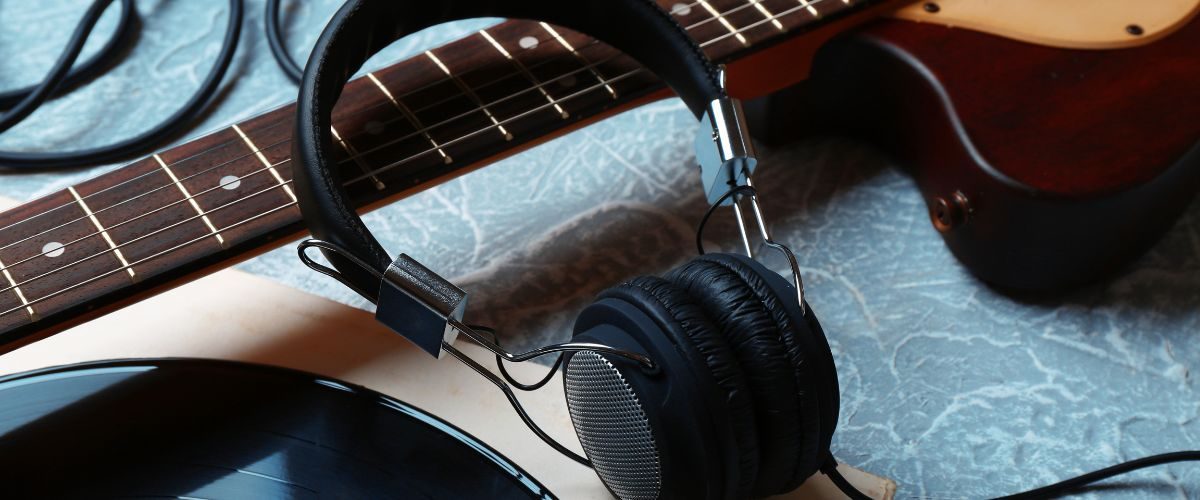
Get ready to be shocked because strumming those strings might boost your brain power by 30%!
Engaging in guitar playing is not just fun; it’s scientifically proven to enhance your cognitive functions, including memory and problem-solving skills, according to research published in Frontiers in Psychology.
Think of it as a win-win: You’ll look cool and feel confident while sharpening your mental abilities. This blog post will take you through how strumming those strings can give your brain a serious workout.
The Science Behind Music and Cognitive Enhancement

Research shows that playing the electric guitar can make your brain work better. It can help you think more clearly, remember things more easily, and solve problems more effectively. In the following sections, we’ll look at how playing the electric guitar and music, in general, can boost your brainpower.
Playing an instrument, like the electric guitar, stimulates various brain regions. This includes areas associated with coordination, hearing, and memory. Guitar playing reinforces neural connections by engaging both the right and left hemispheres of the brain.
Studies from Frontiers in Psychology reveal that musicians often have larger corpus callosums. This structure connects the two hemispheres, facilitating better communication between them. Additionally, playing the guitar enhances neuroplasticity, the brain’s ability to adapt and reorganize.
This fascinating experiment by Frontiers in Neuroscience showed that guitarists could synchronize their brainwaves when playing together. This synchronization boosts their ability to understand and predict each other’s playing, a skill that translates into improved social and cognitive functions.
Neural Plasticity and Music

Learning to play the electric guitar can boost neural plasticity. Neural plasticity is the brain’s ability to reorganize itself by forming new neural connections. This is essential for learning and memory.
Engaging with music, especially learning an instrument like the electric guitar, can stimulate these processes. Playing the guitar requires coordination, fine motor skills, and active listening. Hence, it exercises the brain areas linked to memory and coordination.
Moreover, playing music activates the brain’s reward system, which releases dopamine, a neurotransmitter that makes you feel good.
Auditory Processing and Executive Functions

Playing the electric guitar boosts auditory processing skills, including deciphering different pitches, tones, and rhythms. Enhanced auditory processing translates to improved language skills, as the brain becomes better at distinguishing subtle sounds.
Executive functions, such as planning and problem-solving, also benefit. The multitasking involved in playing a guitar engages these cognitive processes.
When musicians read music, they engage their working memory to recall notes and rhythms. This constant mental juggling strengthens their cognitive flexibility and problem-solving prowess. Musicians are also more adept at task-switching and managing competing demands.
Practical Techniques for Brain Power Augmentation
1. Effective Practice Routines
Consistent practice is crucial for cognitive enhancement. Set specific goals for each session, focusing on skills you want to improve. Use a metronome to develop timing and rhythm.
Break down songs into manageable sections. This approach aids in understanding complex patterns and improving finger agility.

Regularly challenge yourself with new and complex pieces. This stimulates brain activity, keeping your mind sharp. Remember to take short breaks during practice sessions to prevent mental fatigue. Breaks can help consolidate the information learned, making it easier to recall.
Involve a variety of musical styles in your practice sessions. Different genres can introduce new techniques and scales, enriching your musical vocabulary. This variety can enhance neural connections and boost creativity.
2. Incorporating Theoretical Knowledge
Incorporating music theory into practice can significantly enhance cognitive functions. Understanding the relationships between notes, chords, and scales aids memorization and problem-solving.
Practice identifying intervals and chord progressions by ear. This skill is essential for developing a keen musical ear.

Learning to read sheet music is another valuable skill. It provides a deeper insight into musical structures and enhances brain function. You can apply theoretical knowledge practically by composing small pieces or analyzing favorite songs.
Using a mix of structured practice, creative improvisation, and music theory ensures a well-rounded approach to brain training through electric guitar.
Recap: Neurological Impact of Playing an Instrument
Research from Frontiers in Psychology indicates that electric guitar boosts brain power by 30%. This fascinating finding highlights the profound impact music has on our cognitive abilities.
Playing the electric guitar enhances memory and problem-solving skills. Imagine solving puzzles and remembering birthdays like a pro!
The joy of strumming those strings makes excellent music and sharpens the brain. It’s like a workout for your mind with a fantastic soundtrack.
Consider swapping out that crossword puzzle for a guitar. It’s like giving your brain a turbocharged upgrade while having fun.
So, dust off that electric guitar and get ready to rock and roll your way to a sharper mind!
ABOUT:
Robert Emery created Ted’s List during the lockdown of Covid-19. Aside from entertaining audiences worldwide, he tries to inspire the young musicians of tomorrow. Ted’s List can help enormously with this task, as all the writers are world-class, professional musicians. Ted’s List covers all instruments, from Electric Guitar to Violin and Clarinet. Each instrument has a set of dedicated help articles, giving instructional advice on how to play the instrument, and how to improve. There are also informative reviews based on specific instruments, to help the musician choose the best instrument for them.
MEDIA CONTACT INFORMATION:
All press enquiries go to:
Paul Smith – Head of Press/PR
info (at) teds-list.com


